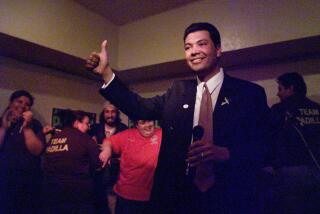Arizona English-fluency case may have wide repercussions
For almost a decade, Alejandrina Cabrera has had no trouble speaking her mind in this dusty Arizona border town.
She’s gone door to door campaigning for City Council candidates. She’s addressed the City Council. She’s even led two recall petitions against the mayor.
But when she decided to run for San Luis City Council, she hit a surprising roadblock: her language.
Like virtually everyone else in town, Cabrera conducts her life in Spanish.
Late last month, Yuma County Superior Court Judge John Nelson ruled that Cabrera’s command of English was insufficient for her to hold public office. She appealed, and the Arizona Supreme Court is expected to rule on her candidacy as early as Monday.
This case is less about English versus Spanish than about small-town politics, but it has potentially wide-reaching implications for border towns where Spanish is spoken at home, at work and just about everywhere else.
Cabrera, a self-described housewife who was born in Yuma but raised in Mexico, speaks shaky English with a heavy accent. She argues that she can read and understand English better than she speaks it, and that her limited ability should not matter.
“I’m not running for senator or the White House,” she said in Spanish. “I’m running in San Luis.”
This agricultural city hugging the border lies 20 miles southwest of Yuma and resembles most Arizona suburbs, with wide streets, strip malls and cactuses standing in for shrubs in front yards. Its population has boomed from about 15,000 in 2000 to 25,000 today. San Luis, with its own police and fire departments, operates on an annual budget of $45 million.
It has the trappings of most American cities, such as its Fourth of July parade and fireworks celebration, but in this case featuring norteña bands playing familiar Mexican songs and 1980s rock cover bands, like an Ohio-based group called the Reaganomics, which played last year.
If San Luis was known outside Arizona for anything before Cabrera’s name was bounced off the ballot, it was as the place where Latino rights activist Cesar Chavez died. A street named in his honor is not far from busy Main Street, which leads to the port of entry and has two grocery stores and some fast-food restaurants.
By the U.S. Census Bureau’s reckoning, San Luis is 98.7% Latino, and whether they’re native-born or immigrants, many residents prefer to use Spanish.
Last week, as people lined up in San Luis City Hall to pay their water bills, a clerk cheerfully greeted a man at the counter before he had a chance to speak.
“Ya le han atendido?” she asked. “Have you been helped yet?”
Over at the McDonald’s, a young employee hustled to take orders, automatically asking, “Buenas tardes. En qué le puedo ayudar?” “Good afternoon. How can I help you?”
San Luis is also distinguished by its bitter — and often personal — political infighting. Local journalists and political spectators almost affectionately call it “Recall City.” Since 2000, seven elected officials have been recalled.
But the latest scuffle over municipal power has potentially broad implications that could determine whether the courts will outline a level of English proficiency for local office seekers. For state lawmakers and statewide positions, Arizona law stipulates that they be able to speak, read and write English without the aid of an interpreter or translator.
Another law requires English of local officeholders too, but Cabrera’s lawyers argue that it does not set a level of proficiency.
“It’s not just about what will happen to Alejandrina,” said Ryan Hengl, one of her attorneys. “What will happen if someone has a problem with someone’s accent? I think Judge Nelson opened up Pandora’s box.”
Indeed, in San Luis, past mayors and officials have gotten by without much English.
Carlos Bernal was one of them.
Standing under a canopy blocking the intense Arizona sun, Bernal said in Spanish that the only English he knew when he was first elected to the City Council in 1996 was picked up over five years of instruction at middle and high schools in Sinaloa, Mexico. Bernal served two terms, surviving one recall attempt in 2004.
“My pronunciation was weak,” he said. “It’s rare to have council members who have a 100% grasp of the English language. There have been very few.”
At the urging of former Mayor Guillermina Fuentes, current Mayor Juan Carlos Escamilla filed the lawsuit challenging Cabrera’s English abilities in December. Fuentes, who had a political falling out with Cabrera, has admitted her English is not perfect either.
But these admissions don’t seem to matter to most residents.
During City Council meetings, interpreters stand by to assist Spanish-speakers, but most people understand them anyway.
Such is life in border towns. El Cenizo, along the Texas-Mexico border, made national headlines in 1999 when it passed an ordinance that would allow the city to conduct meetings in Spanish. The ordinance is still on the books, despite the backlash the town endured.
In San Luis, council meetings are officially conducted in English, but Spanish does creep in.
“I always switch back and forth between English and Spanish,” Floribella Redondo said about her presentations to the City Council. Redondo is director of Campesinos Sin Fronteras, a nonprofit group that works with the town’s sizable migrant worker population.
Versed in San Luis’ bitter political spats, Redondo said she usually sided with Escamilla — except his suit to thwart Cabrera’s candidacy.
“I think that everybody has a right to serve,” she said. “If she’s willing to serve and do a good job … I think that the English part should not be the thing that separates her from serving.”
Cabrera’s English is at “basic survival” level, according to William Eggington, a linguist at Brigham Young University hired by the city to test her skills.
Speaking alongside Nieves Riedel, another former San Luis mayor, Cabrera said last week that she struggled to understand Eggington because she is hard of hearing and unaccustomed to his accent. He’s from Australia.
Regardless, Riedel, a commercial real estate developer and vocal critic of Escamilla, stands firm that Cabrera’s English proficiency is no worse — and in some cases better — than that of past officials.
“If this man had given us all a test, we all would have flunked,” she said tartly in English.
More to Read
Start your day right
Sign up for Essential California for news, features and recommendations from the L.A. Times and beyond in your inbox six days a week.
You may occasionally receive promotional content from the Los Angeles Times.







